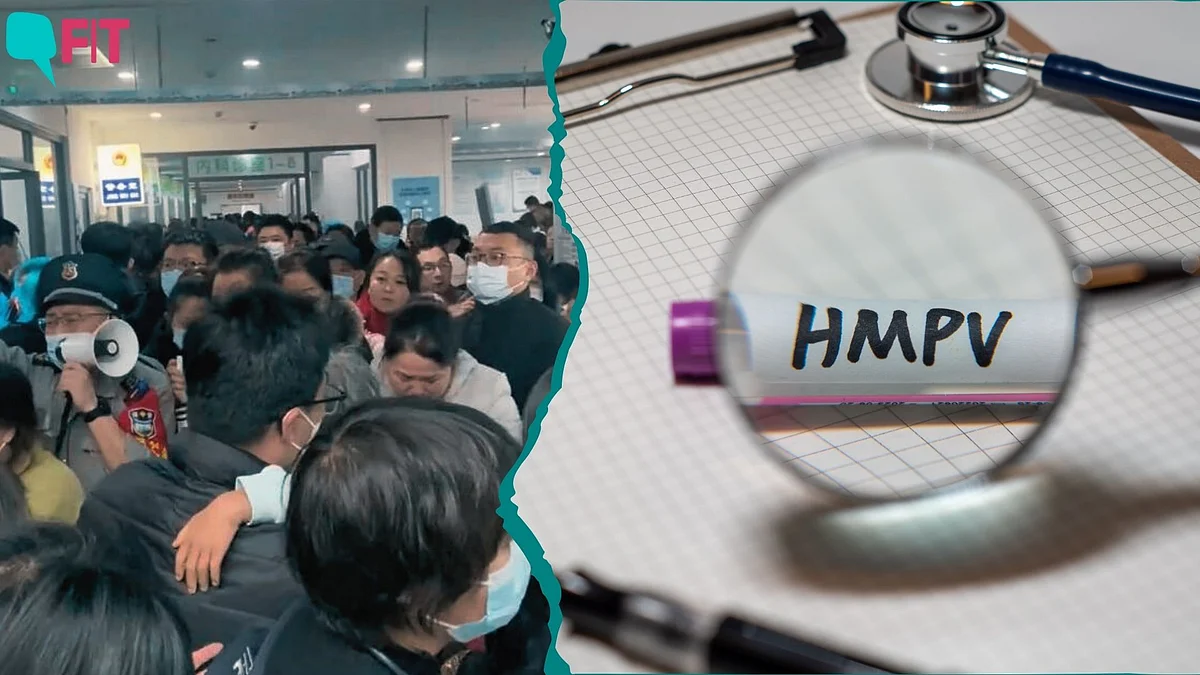
'Not COVID, Don't Panic': Why the HMPV Outbreak in China Shouldn't Cause Alarm
HMPV is unlikely to cause the kind of pandemic that COVID-19 caused, experts tell The Quint.

advertisement
The end of 2024 marked the fifth anniversary of the beginning of the COVID-19 pandemic. At the same time, reports surfaced of another potential 'global health threat' – an outbreak of the airborne respiratory virus HMPV (Human Metapneumovirus) circulating in China.
The internet was flooded with alarming headlines, such as:
"China HMPV Outbreak: New Pandemic Threat?"
"HMPV Outbreak: Could This Be China's Next COVID-19?"
"5 Years After COVID, New Pandemic Outbreak in China."
But is this truly another cause for global concern? Before you start to panic, let’s take a look at what experts are saying.
Latest Developments
Last week, video clips from hospitals in China showing them being overwhelmed with patients suffering from flu-like symptoms went viral, with some reports claiming that the country is seeing a spike in respiratory viral infections caused by Influenza A and HMPV. Reminiscent of the early days of COVID-19, these videos sparked concerns among the public.
A screengrab from a videoclip circulating online shows a crowded hospital in Northern China.
(Screenshot source: X/@COVID19_disease)
Speaking to FIT, renowned virologist Dr John T Jacob says, "I believe people are worried because, since COVID-19, there has been heightened concern about viral outbreaks in China. There is also the perceived secrecy surrounding disease data in China adding to the unease. As a result, any infectious disease emerging in the country tends to be met with suspicion."
In a statement released by on 4 January, the Union Ministry of Health and Family Welfare has said, "The WHO has been requested to share timely updates regarding the situation".
The health ministry also stated that a Joint Monitoring Group meeting of the top health authorities in India was held under the chairmanship of DGHS (Directorate General of Health Services) to assess the situation.
The health ministry emphasised that these viruses are already circulating globally, including in India, adding, "the Union Health Ministry is closely monitoring the situation in China through all available channels."
What Do We Know About the Virus?
"It's an old virus that has always been there," Dr Mala Kaneria, Consultant, Infectious Diseases & HIV Medicine Jaslok Hospital & Research Centre, tells FIT.
HMPV is a respiratory virus like influenza and RSV that can cause a range of illnesses, from mild cold-like symptoms to more severe respiratory conditions.
Dr Kaneria explains,
In fact, she adds, "It tends to affect immunocompromised people, children below the age of five, and the elderly (over the age of 65) more than it would a regular immunocompetent individual."
If it's an old virus that's been in circulation for years, why is it suddenly making the news now?
"It was only after COVID-19 that we started testing for and distinguishing these viruses more effectively," Dr Jacob adds.
He goes on to explain, "Now, there is more virological diagnosis happening compared to before. Most people who have flu-like symptoms don't get tested for the actual diseases. People don't bother much about what virus is causing it, unless it gets serious or presents atypical symptoms."
There are mainly two reasons why we don't do this in most cases:
Symptoms are generally mild to moderate and short-lasting, typically not lasting more than 3 to 4 days.
The testing kits are expensive.
Why There's No Need for Alarm
While the HMPV virus spreads and acts similar to the SARS‑CoV‑2 virus, according to Dr Jacob, HMPV is unlikely to cause the kind of pandemic that COVID-19 caused.
"There is no need for any anxiety. It’s not a disease with a high fatality rate," he adds.
According to data from an article published in Lancet Global Health in 2021, HMPV has a fatality rate of one percent, primarily in children under the age of five.
Dr Kaneria concedes, saying, "As of now, I don't think HMVP is a cause for panic. In the winter, viruses tend to mutate, and we usually see a rise in viral infections."
The Chinese Centre for Disease Control (China CDC) has also stated that the current spike in respiratory cases in the northern part of the country is consistent with seasonal trends and isn’t anything out of the ordinary.
A similar spike in respiratory infections is expected in other parts of the world, including India, at this time of year.
Speaking to the press on Sunday, 5 January, Dr Atul Goel, Director-General of Health Services, reassured that hospitals are well-prepared for the seasonal surge in respiratory infections.
That said, experts also urge caution.
"There is no vaccine, or specific treatment for HMPV at the moment. The most important thing, like we learnt during COVID is that prevention is the best cure," says Dr Kaneria.
Wash your hands frequently.
Cover your nose and mouth when sneezing.
Wear a mask and avoid crowded places, especially when you're feeling unwell.
As always, protect immunocompromised individuals and children, practise good hand hygiene, and prevent the spread of flu-like symptoms.
- Access to all paywalled content on site
- Ad-free experience across The Quint
- Early previews of our Special Projects
Published: undefined